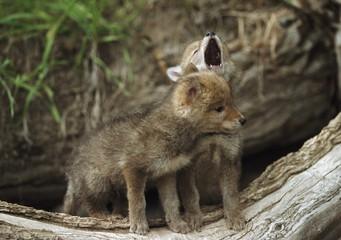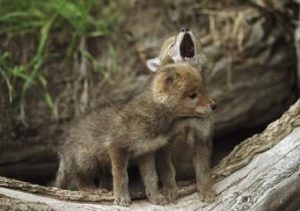 What could be cuter than a tiny baby coyote playing around and practicing how to howl with his littermate brothers and sisters? Well, these babies won’t stay tiny very long, and they have much to learn if they are to survive into adulthood in the wild.
What could be cuter than a tiny baby coyote playing around and practicing how to howl with his littermate brothers and sisters? Well, these babies won’t stay tiny very long, and they have much to learn if they are to survive into adulthood in the wild.
A baby coyote (Canis latrans) is also known as a coyote pup. The chances of a coyote pup surviving the summer into adulthood are actually pretty low. Between the many coyote and deer hunters out there trying to keep the coyote population down, the odds of being struck by a vehicle, and larger predators looking for food, the coyote pup has to adapt to their surroundings quickly and watch and learn from their parents if they want to make it past their first year.
First Few Months of Life
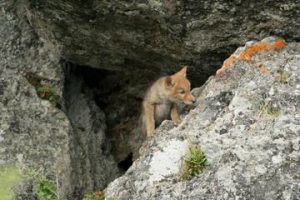 Coyotes will breed in the cooler months, particularly late December through early spring with February and March being the prime-time months. Once the alpha male and alpha female have successfully mated, the female has a gestation period of approximately 63 days. During this time, she will find a den to claim that will be where she will have her pups and keep them until they are old enough.
Coyotes will breed in the cooler months, particularly late December through early spring with February and March being the prime-time months. Once the alpha male and alpha female have successfully mated, the female has a gestation period of approximately 63 days. During this time, she will find a den to claim that will be where she will have her pups and keep them until they are old enough.
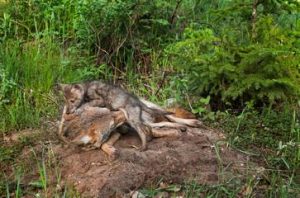 While the mother stays in her den, the male coyote will hunt for food and will return to the den with meals for the female to keep her fed and healthy. This behavior will continue once the female has her pups. The male will not enter the den but will leave food for the mother and litter outside the entrance.
While the mother stays in her den, the male coyote will hunt for food and will return to the den with meals for the female to keep her fed and healthy. This behavior will continue once the female has her pups. The male will not enter the den but will leave food for the mother and litter outside the entrance.
Coyote litters can range from one pup to nineteen pups. The average litter size is four to six pups, and litter size will depend on various factors from available diet and food sources to the concentration of coyote population in the area.
When the coyote pups are born, they are temporarily blind for about ten days. Their ears are also floppy like a dog’s ear. For these first ten days, the coyote pups will be dependent on their mother for milk to survive.
The male coyote will continue to bring the female coyote food, so she can produce milk long enough to support her litter. When they become weaned from their mother’s milk, the male and now the female will feed them regurgitated food until they can eat whole food on their own.
Becoming Adults
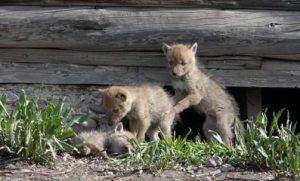 Once the coyote pups are weaned from their mother, the coyote pack will abandon the den. This an important time in a coyote pup’s life where they will first encounter the world they will live in. They must adjust and catch on quickly to avoid being an easy meal for larger predators like cougars or wolves.
Once the coyote pups are weaned from their mother, the coyote pack will abandon the den. This an important time in a coyote pup’s life where they will first encounter the world they will live in. They must adjust and catch on quickly to avoid being an easy meal for larger predators like cougars or wolves.
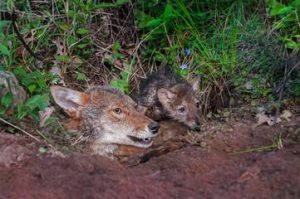 The mother coyote will carefully teach her pups how to hunt and feed themselves. The male and female coyote will protect their pups tirelessly while they are still young. Coyote pups will practice their hunting skills to entertain themselves as well as fight with their littermates to establish the pack hierarchy. They will help their parents patrol the territory until they are grown.
The mother coyote will carefully teach her pups how to hunt and feed themselves. The male and female coyote will protect their pups tirelessly while they are still young. Coyote pups will practice their hunting skills to entertain themselves as well as fight with their littermates to establish the pack hierarchy. They will help their parents patrol the territory until they are grown.
Coyote pups are almost fully grown in size at about nine months from birth. This is usually sometime in the fall to coincide with the breeding season in late winter/ early spring. During the time from when they are born to the following breeding season, they will be members of their parents’ pack.
When fall arrives, the alpha male coyote will force the male offspring to leave the pack. From there they will move on to either establish their own territory or find an estrous female to breed. The female offspring will usually stay with their mother and remain members of the pack.
Discovering a Pup
Although they look cute and harmless, it can be very dangerous to approach a coyote pup. For one, the pup may be curious enough to let you get too close, then panic and sound off an alarm call to his mother or father that is most likely close by.
Coyotes are fiercely protective of their young, even against humans. While a coyote attack on humans is extremely rare, they will do whatever necessary to stop a threat to their pups. If you come across a coyote den or pup, you should do the following:
- Back away quickly or take an additional route away from the den
- Do not make a motion toward the pup to touch or pet
- Try to make loud noises to scare the pup away
Can I Raise the Pup Myself?
Coyotes are wild animals and should be treated as such. While they are cute as babies, they are not by any means domestic pets. One of the biggest undertakings would be feeding the pup because coyotes tend to eat small animals and rodents such as mice, rats, rabbits, squirrels, and other small mammals. They also eat larger game such as deer.
The responsibility of feeding this type of animal and finding consistent food sources would be too great for anybody to take on. It is definitely not like taking care of your domestic cats and domestic dogs.
Additionally, it is inhumane to feed them regular pet food and keep them caged up. Again, they are wild animals and need to roam free, run, and live the way they were destined to live- as wild coyotes.
Finally, it is illegal to own or raise any wild animal including coyotes, wild fox, or any type of mixed breed.
